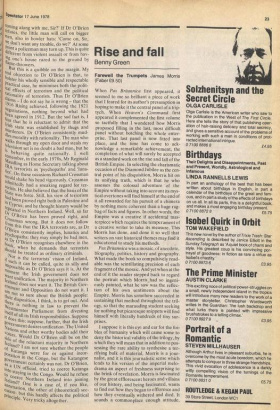Rise and fall
Benny Green
Farewell the Trumpets James Morris (Faber E9.50) When Pax Britannica first appeared, it seemed to me so brilliant a piece of work that I feared for its author's presumption in hoping to make it the central panel of a triptych. When Heaven's Command first appeared it complemented the first volume so tactfully that I wondered how Morris proposed filling in the last, most difficult panel without botching the whole enterprise. That last panel is now fitted into place, and the time has come to acknowledge a remarkable achievement, the completion of what will surely be accepted as a standard work on the rise and fall of the British Empire. In selecting the charismatic occasion of the Diamond Jubilee as the central point of his disquisition, Morris hit on its unifying truth, which is that he who assesses the colossal adventure ' of the Empire without taking into account its mystical overtones will find himself at the end of it all rewarded for his pursuit of a chimera by nothing more coherent than a huge ragbag of facts and figures. In other words, the Empire was a creative if accidental masterpiece which requires the temperament of a creative writer to take its measure. This Morris has done, and done it so well that writers on vast historical themes may find it educational to study his methods.
Pax Britannica was a mosaic, of anecdote, biography, politics, history and geography. What made the book so compulsively readable was the scintillating precision of each fragment of the mosaic. And yet when at the end of it the reader stepped back to regard the portrait which Morris, had so ingeniously painted, what he saw was the reflection of his own sentiments about the Empire. Morris has somehow succeeded in
sustaining that method throughout the trilogy, so that the marauding student seeking for nothing but picaresque snippets will find himself with literally hundreds of tiny surprises.
I suppose it is this eye and ear for the foibles of humanity which will cause some to deny the historical validity of the trilogy, by which they will mean that in addition to possessing the rare ability to synthesise a ter rifying bulk of material, Morris is a jour nalist, and it is this journalistic sense which lends to his version of the imperial melo drama an aspect of freshness surprising to the brink of revelation. Morris is fascinated by the great efflorescent heroes and villains of our history, and being fascinated, wants to find out'how they began to effloresce and how they eventually withered and died. It sounds a commonplace enough attitude, except that no historians ever strike it. So we learn from the last instalment of the trilogy that President Kruger died in Switzerland; that when, after his meeting with George V, Gandhi was asked if he considered himself to have been adequately dressed for the occasion, he replied, 'The King had enough on for both of us'; that the Commander of the British Grand Fleet who accepted the German naval surrender had once sailed in a gunboat towards Omdurman; that when Fisher resigned over the Dardanelles, the King wanted to have him hanged from the yardarm for desertion; that some of the British spies playing the Great Game in and around Tibet were equipped with prismatic compasses disguised as prayer wheels.
Much of this recondite but vital information is tucked away in footnotes; I believe I read somewhere that Morris was a devoted admirer of the technique of using the footnote as a device for enlarging the perspective of the main text, and Farewell the Trumpets shows him to be a master of the art. Here is one example among hundreds; I select it because in exhibiting Morris's meticulous journalistic accuracy, his relentless journalistic curiosity and his enviable skill as a writer of sinuous, rhythmic prose, it discloses as well as any other fragment the spirit of the whole enterprise. Morris has been discussing the two ships which figured in the gunrunning escapades of both sides in the Irish Troubles. Unlike all the other hundreds of writers on the subject, he has decided to find out what happened to those vessels afterwards: The Clyde Valley has been less lucky. For thirty years she traded in Canada, but in 1968, eighty-two years old, she was bought by a group of Ulster militants and sailed back to Larne to be a floating museum. Money ran out, and in 1974, by now the oldest registered steamship afloat in British waters, she was sold to a Lancashire scrap metal company and towed across the Irish Sea to Lancaster. There beside St George's Quay I found her in 1975, her future uncertain, her hull rusted, her funnel and masts gone, her bulwarks scrawled with graffiti, while the Carlisle trains clanked over the bridge upstream . . .
Having now completed his great task, having published more than half a million
words on the subject, what are Morris's conclusions? We know from earlier volumes that in his view it was 'time for the Empire to go'; he regretted its passing because the death of all great enterprises is a sad business. As to the accuracy of the impression with which he leaves us, he says, at the end of Farewell the Trumpets, 'Is that the truth? Is that how it was? It is MY truth. It is how Queen Victoria's Empire seemed in retrospect, to one British citizen in the decades after its dissolution'. I really cannot see how any literate person could not wish to possess all three volumes of this superlative work.



































 Previous page
Previous page